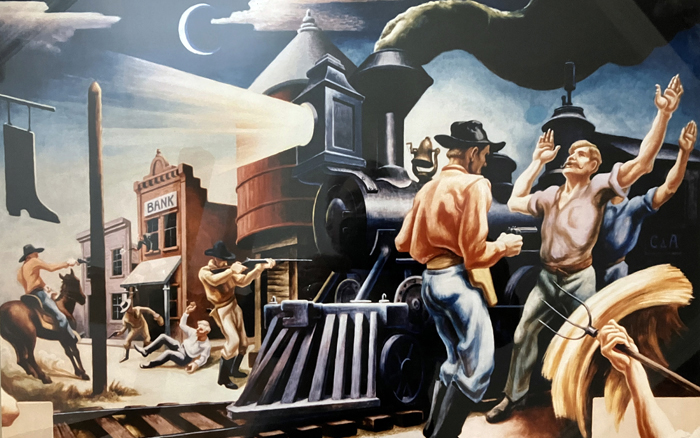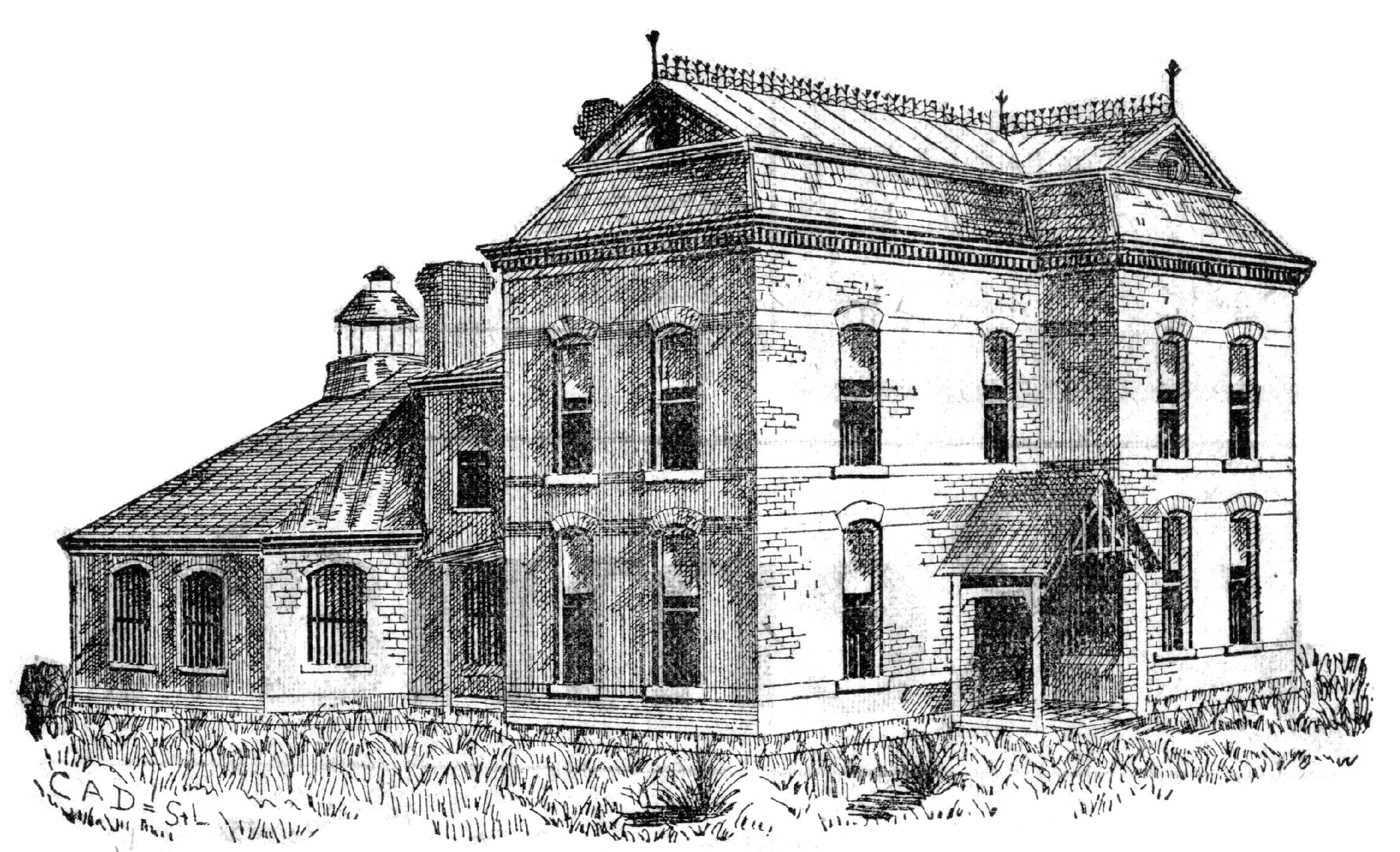This following account of the 1881 train robbery which occurred in July, 1881, on the Chicago, Rock Island & Pacific Railroad near Winston, MO, as recorded in the 1882 History of Daviess County (pp. 504-507). Images added for digital display here were not a part of the original historical account.
TRAIN ROBBERY AT WINSTON
Winston, a village of some three hundred and fifty in habitants, on the Chicago, Rock Island & Pacific Railroad, in Colfax Township, this county, was the scene of a daring train robbery and murder on the night of July 15th, 1881, which occasioned intense excitement all of the State and led to fierce denunciations of the file perpetrators of the deed. Winston is some eleven miles from Gallatin, and a large crowd collected at the depot to await the arrival of the train and discuss the details of the crime. The fact that several of Gallatin’s citizens were on board, excited a deeper interest in the tragic occurrence.
The robbers were seven in number and were equipped after the most approved style for the desperate work they had undertaken. Dark masks hid their features, and heavy revolvers hung at either side of their waists within easy reach. They boarded the train in couples and as the train drew out of Winston, began their work. There were about thirty passengers in the smoking car, while the rear passenger coach was very near filled. The conductor, William Westfall, passed into the smoking car from the baggage car and began to take up the tickets. He came slowly down the aisle and when about halfway, a tall man in the rear of the coach suddenly arose and ordered “everybody down!” The sharp command was emphasized by a ringing shot from a large revolver. On the instant all was excitement.
Conductor Westfall did not obey the command, but seemed on the point of pulling the bell rope. His hand was scarcely lifted, when the robber swung quickly around with a revolver in each hand and with the quickness of the lightning’s flash two bullets went on their fatal way to Westfall’s breast. The wounded man staggered to the door and fell from the train, dead. The first man was joined by a second and the two kept up a steady firing at random, shattering window glass and transoms, as they moved through the car. As soon as they left the coach several passengers went out to the rear of the platform. Firing was going on all the time. Shots could be heard in the front and the rear.
The two men returned and again passed through the “smoker,” all the time shooting recklessly, but seemingly with no intention of hitting any of the passengers, and stationed themselves on the front platform of the same car. As the shooting ceased for a moment several passengers on the rear platform peered through the windows into the car and immediately a bullet shattered the glass. Shortly after another man on the platform raised up and looked into the car, a pistol shot rang out upon the air and a bullet crashed through the brain of Frank McMillan, and he fell from the train, a corpse.
In the meantime, while these tragic events were transpiring in the smoking car, others equally excitable were taking place on the engine and in the baggage car. Two men began a rapid fusilade upon the engineer and fireman, but fortunately no damage was done further than breaking the glass. When the shooting began the occupants of the cab put out the lights and made their way to a safe position under the headlight, on the “cow-catcher,” where they remained safely ensconced, while two masked men took possession of the engine, one officiating as engineer while the other kept guard.
Three of the brigands captured the baggage car and at the muzzles of their revolvers forced the express messenger to open the safe, from which they took the contents, variously estimated at from $3,000 to $15,000, and rapidly placed the packages into a sack carried for that purpose. After securing the contents of the safe the bold freebooters made no further attempts at robbery, but at a given signal, left the train at a point probably a miles distant from Winston, where they found horses in waiting for them at a small grove and, which a parting volley, they galloped away.

This impressive stone culvert is located a mile east of Winston, MO, on the now abandoned railroad bed of the Chicago, Rock Island & Pacific Railroad. This is about the location where the train robbery involving murder by outlaws Frank & Jesse James occurred. However, this stone culvert easily visible next to Highway 6 was constructed after the infamous crime occurred.
WHO WERE THEY?
The news spread rapidly, and parties were organized and put off in active pursuit, but the desperadoes being well mounted rapidly distanced all pursuers, and up to the first of December, 1881, no trace has been found of them. Rewards amounting to $50,000 have been offered for their capture but they are still at large. It was the almost unanimous verdict of those familiar with the details of the murder and robbery, that the James boys were the leaders of the gang.
The following from Judge McDougal of Gallatin shows the general opinion in that regard to the capture:
“The robbers will never be caught. They know the country too well for that. They had been around the country about Winston for four or five days, and were thoroughly acquainted with the lay of the ground. And then they had the best horses in the country; if the citizens had been right on the spot and started after them, the robbers could easily have ridden away from them. No doubt by the time pursuit commenced they were well out of the county. I think the James brothers were connected with it, and one, at least, of them was there.”

One of the scenes painted by Thomas Hart Benton (1889-1975) featured in the Missouri State Capitol at Jefferson City features outlaw Jesse James in a mythical train/bank robbery. Benton’s work adorns the House Lounge on the third floor of the Capitol. The murals were commissioned by the legislature in early 1935 for $16,000 and completed in December 1936.
THE EVIDENCE
Below is given the sworn testimony of the principal witness of the fatal tragedy:
J.L. Penn, being duly sworn, said: “I live in Wilton Junction, Iowa. I was on the eastern bound train on the evening of July 15, 1881. I was in the front car. Just after leaving the depot at Winston, three men entered from the front door. Each was dressed in a dark suit of clothes, with high caps, and were masked. The conductor was in the act of putting a check in my brother’s hat. Two of the men fired at the conductor. The conductor went toward the rear of the car, was in a stooping position as though shot. The men followed him, shooting at random in the car. The conductor and the three men passed out of the car at the rear end. Did not see the conductor after he left the car. The three men went into the next car, firing as they went, In a few minutes they turned and went into the first mentioned car. They fired two or three more shots as they went back through the car. One stood on the platform and two went into the baggage car.
“When they first entered the car one of them said stop to the conductor. I heard several shots fired after they went into the baggage car. As they entered the baggage car Frank McMillan and myself went to the rear platform of the car and sat on the steps. Firing ceased. I raised up and looked forward into the baggage car, when one of them fired at me, breaking a glass near me. I then sat down again. In a short time McMillan raised up and looked in at the window. A shot was fired, and Frank McMillan fell forward on the platform.
“The train came to a stop at the Dog Creek bridge. While standing I heard some one say move on farther and the train moved on to Little Dog Creek bridge and stopped. In a few minutes three men passed me as I sat on the steps. They were on the south side of the track and went down the dump. I then got off in company with R.W. Penn and A. McMillan, and started to look for Frank. We came back toward Winston, about a fourth of a mile. We met George Steward and others with a hand-car. A portion of us walked on each side of the track, looking for Frank McMillan or others. We found his body a short distance this side of the bridge. Some of the men put him on the hand-car and brought him to town.”
The testimony of several other witnesses was substantially the same as the foregoing. Conductor Westfall’s remains were taken to Plattsburg and interred.

Wm. Westfall [1843-1881] was killed during the train robbery at Winston by Frank & Jesse James on July 15, 1881. Westfall was the train conductor. He is buried in the old Plattsburg Cemetery. (1989 photo)

